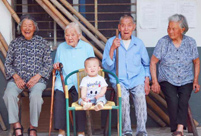 Happy life in Xinjiang
Happy life in Xinjiang
 2014 China Hainan Int'l Automotive Exhibition kicks off
2014 China Hainan Int'l Automotive Exhibition kicks off
 Collection of 'China Dream' public-spirited ads
Collection of 'China Dream' public-spirited ads
 The silent holy stones
The silent holy stones
 University students take care of giant pandas
University students take care of giant pandas
 Leading lady a true legend
Leading lady a true legend
 China Pan-Asia Stone Expo held in Kunming
China Pan-Asia Stone Expo held in Kunming
 Taiwan woman marries into Kazak family, 100 sheep plus a flat as dowry
Taiwan woman marries into Kazak family, 100 sheep plus a flat as dowry
 College girls take graduation photos under water in Chongqing
College girls take graduation photos under water in Chongqing
 Cartoon: Xi and football
Cartoon: Xi and football
GENEVA, July 11 -- Failure to provide adequate HIV services for certain key populations threatens global progress on the HIV response, the World Health Organization (WHO) warned on Friday.
According to a new HIV guideline released by the WHO, these populations include men who have sex with men, people in prison, people who inject drugs, sex workers and transgender people.
"Failure to provide services to the people who are at greatest risk of HIV jeopardizes further progress against the global epidemic and threatens the health and wellbeing of individuals, their families and the broader community," Gottfried Hirnschall, director of the HIV department at the WHO, said in a statement.
The guideline outlines steps for countries to reduce new HIV infections and increase access to HIV testing, treatment and care for these five key populations.
For the first time, the WHO strongly recommended men who have sex with men consider taking antiretroviral medicines as an additional method of preventing HIV infection alongside the use of condoms.
The WHO estimated that globally 20-25 percent reductions in HIV incidence among men who have sex with men could be achieved through pre-exposure prophylaxis, averting up to 1 million new infections among this group over ten years.
In the guideline, WHO also recommended that countries address the legal and social barriers that prevent many from seeking medical services.
 How Chinese men kill the time when their wives practice square dancing?
How Chinese men kill the time when their wives practice square dancing? Chinese Navy frogmen in training: photos
Chinese Navy frogmen in training: photos Lishui, city of longevity with 186 healthy men above 100 years old
Lishui, city of longevity with 186 healthy men above 100 years old Hong Kong Fashion Festival kicks off
Hong Kong Fashion Festival kicks off Germany crush Brazil to advance to World Cup final
Germany crush Brazil to advance to World Cup final Danish badminton team plays Chinese social media users on Asia tour
Danish badminton team plays Chinese social media users on Asia tour Art on eggshells
Art on eggshells Test flight of Russian amphibian BE-103 in Shenyang, NE China
Test flight of Russian amphibian BE-103 in Shenyang, NE China Stewardesses of CHR trains experience walk with white cane
Stewardesses of CHR trains experience walk with white cane Picturesque Bashang Prairie through lens
Picturesque Bashang Prairie through lens 'Finding Nemo' in Seattle Aquarium
'Finding Nemo' in Seattle Aquarium 28 old villages in Hunan under preservation
28 old villages in Hunan under preservation Anti-terrorism drills held in Luliang, Shanxi province
Anti-terrorism drills held in Luliang, Shanxi province Hot weather drives citizens to play mahjong in water
Hot weather drives citizens to play mahjong in water Largest domestic UAV exhibition held in Beijing
Largest domestic UAV exhibition held in BeijingDay|Week|Month